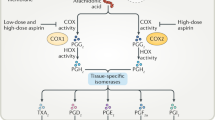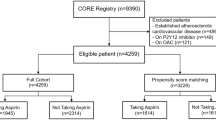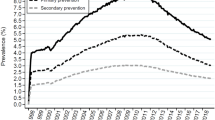Abstract
Aspirin is effective for the prevention of cardiovascular events in patients with a history of vascular disease, as so-called secondary prevention. In general populations with no history of previous myocardial infarction or stroke, aspirin also seems useful for primary prevention of cardiovascular events, although the absolute benefits are smaller than those seen in patients with previous cardiovascular disease. Patients with diabetes mellitus are at an increased risk of cardiovascular events, but new trials have raised questions about the benefit of aspirin for primary prevention in patients with this disorder. This Review comprehensively examines the basic pharmacology of aspirin and provides an overview of the randomized, controlled trials of aspirin therapy that have included patients with diabetes mellitus. On the basis of currently available evidence from primary prevention trials, aspirin is estimated to reduce the relative risk of myocardial infarction and stroke by about 10% in patients with diabetes mellitus; however, aspirin also increases the risk of gastrointestinal bleeding. As such, low-dose aspirin therapy (75–162 mg) is reasonable for patients with diabetes mellitus and a 10-year risk of cardiovascular events >10%. Results from upcoming large trials will help clarify the effects of aspirin with greater precision, including whether the benefits differ between men and women.
Key Points
-
Patients with diabetes mellitus exhibit increased platelet reactivity
-
Randomized trials of aspirin for the primary prevention of cardiovascular events in patients with diabetes mellitus have studied heterogeneous populations and exhibit heterogeneous results
-
Aspirin (75–162 mg daily) for primary prevention is reasonable for patients with diabetes mellitus and moderate or high cardiovascular disease risk (10-year risk >10%) that are not at high risk of gastrointestinal bleeding
-
Patients with low cardiovascular disease risk (10-year risk <5%) should not use aspirin as a preventive measure
-
Ongoing trials of aspirin therapy in patients with diabetes mellitus will help to provide more definitive conclusions
This is a preview of subscription content, access via your institution
Access options
Subscribe to this journal
Receive 12 print issues and online access
$209.00 per year
only $17.42 per issue
Buy this article
- Purchase on Springer Link
- Instant access to full article PDF
Prices may be subject to local taxes which are calculated during checkout

Similar content being viewed by others
References
Antithrombotic Trialists' Collaboration. Collaborative meta-analysis of randomised trials of antiplatelet therapy for prevention of death, myocardial infarction, and stroke in high risk patients. BMJ 324, 71–86 (2002).
Baigent, C. et al. Aspirin in the primary and secondary prevention of vascular disease: collaborative meta-analysis of individual participant data from randomised trials. Lancet 373, 1849–1860 (2009).
Hayden, M., Pignone, M., Phillips, C. & Mulrow, C. Aspirin for the primary prevention of cardiovascular events: a summary of the evidence for the U.S. Preventive Services Task Force. Ann. Intern. Med. 136, 161–172 (2002).
Berger, J. S. et al. Aspirin for the primary prevention of cardiovascular events in women and men: a sex-specific meta-analysis of randomized controlled trials. JAMA 295, 306–313 (2006).
Ridker, P. M. et al. A randomized trial of low-dose aspirin in the primary prevention of cardiovascular disease in women. N. Engl. J. Med. 352, 1293–1304 (2005).
Almdal, T., Scharling, H., Jensen, J. S. & Vestergaard, H. The independent effect of type 2 diabetes mellitus on ischemic heart disease, stroke, and death: a population-based study of 13,000 men and women with 20 years of follow-up. Arch. Intern. Med. 164, 1422–1426 (2004).
Ogawa, H. et al. Low-dose aspirin for primary prevention of atherosclerotic events in patients with type 2 diabetes: a randomized controlled trial. JAMA 300, 2134–2141 (2008).
Belch, J. et al. The prevention of progression of arterial disease and diabetes (POPADAD) trial: factorial randomised placebo controlled trial of aspirin and antioxidants in patients with diabetes and asymptomatic peripheral arterial disease. BMJ 337, a1840 (2008).
Pignone, M. et al. Aspirin for primary prevention of cardiovascular events in people with diabetes: a position statement of the American Diabetes Association, a scientific statement of the American Heart Association, and an expert consensus document of the American College of Cardiology Foundation. Diabetes Care. 33, 1395–1402 (2010).
Pedersen, A. K. & FitzGerald, G. A. Dose-related kinetics of aspirin. Presystemic acetylation of platelet cyclooxygenase. N. Engl. J. Med. 311, 1206–1211 (1984).
FitzGerald, G. A., Pedersen, A. K. & Patrono, C. Analysis of prostacyclin and thromboxane biosynthesis in cardiovascular disease. Circulation 67, 1174–1177 (1983).
Patrono, C., García Rodríguez, L. A., Landolfi, R. & Baigent, C. Low-dose aspirin for the prevention of atherothrombosis. N. Engl. J. Med. 353, 2373–2383 (2005).
Rocca, B. et al. Cyclooxygenase-2 expression is induced during human megakaryopoiesis and characterizes newly formed platelets. Proc. Natl Acad. Sci. USA 99, 7634–7639 (2002).
Tohgi, H., Konno, S., Tamura, K., Kimura, B. & Kawano, K. Effects of low-to-high doses of aspirin on platelet aggregability and metabolites of thromboxane A2 and prostacyclin. Stroke 23, 1400–1403 (1992).
Patrono, C. Aspirin as an antiplatelet drug. N. Engl. J. Med. 330, 1287–1294 (1994).
Clarke, R. J., Mayo, G., Price, P. & FitzGerald, G. A. Suppression of thromboxane A2 but not of systemic prostacyclin by controlled-release aspirin. N. Engl. J. Med. 325, 1137–1141 (1991).
Santilli, F. et al. Platelet cyclooxygenase inhibition by low-dose aspirin is not reflected consistently by platelet function assays: implications for aspirin “resistance”. J. Am. Coll. Cardiol. 53, 667–677 (2009).
Smith, J. B. & Willis, A. L. Aspirin selectively inhibits prostaglandin production in human platelets. Nat. New Biol. 231, 235–237 (1971).
Quick, A. J. Salicylates and bleeding: the aspirin tolerance test. Am. J. Med. Sci. 252, 265–269 (1966).
Hovens, M. M. et al. Prevalence of persistent platelet reactivity despite use of aspirin: a systematic review. Am. Heart J. 153, 175–181 (2007).
Abaci, A. et al. Effect of increasing doses of aspirin on platelet function as measured by PFA-100 in patients with diabetes. Thromb. Res. 116, 465–470 (2005).
Mirkhel, A. et al. Frequency of aspirin resistance in a community hospital. Am. J. Cardiol. 98, 577–579 (2006).
Eikelboom, J. W. & Hankey, G. J. Aspirin resistance: a new independent predictor of vascular events? J. Am. Coll. Cardiol. 41, 966–968 (2003).
Schneider, D. J. On defining aspirin resistance. J. Am. Coll. Cardiol. 46, 1710–1711 (2005).
Michelson, A. D. Methods for the measurement of platelet function. Am. J. Cardiol. 103 (Suppl. 3), 20A–26A (2009).
Williams, C. D., Cherala, G. & Serebruany, V. Application of platelet function testing to the bedside. Thromb. Haemost. 103, 29–33 (2010).
Eikelboom, J. W. et al. Aspirin-resistant thromboxane biosynthesis and the risk of myocardial infarction, stroke, or cardiovascular death in patients at high risk for cardiovascular events. Circulation 105, 1650–1655 (2002).
Snoep, J. D., Hovens, M. M., Eikenboom, J. C., van der Bom, J. G. & Huisman, M. V. Association of laboratory-defined aspirin resistance with a higher risk of recurrent cardiovascular events: a systematic review and meta-analysis. Arch. Intern. Med. 167, 1593–1599 (2007).
Geisler, T. et al. The Residual Platelet Aggregation after Deployment of Intracoronary Stent (PREDICT) score. J. Thromb. Haemost. 6, 54–61 (2008).
Serebruany, V. et al. Association of platelet responsiveness with clopidogrel metabolism: role of compliance in the assessment of “resistance”. Am. Heart J. 158, 925–932 (2009).
Peters, R. J. et al. Effects of aspirin dose when used alone or in combination with clopidogrel in patients with acute coronary syndromes: observations from the Clopidogrel in Unstable angina to prevent Recurrent Events (CURE) study. Circulation 108, 1682–1687 (2003).
Colwell, J. A. et al. Altered platelet function in diabetes mellitus. Diabetes 25 (Suppl. 2), 826–831 (1976).
Watala, C. et al. Reduced sensitivity of platelets from type 2 diabetic patients to acetylsalicylic acid (aspirin)-its relation to metabolic control. Thromb. Res. 113, 101–113 (2004).
Anfossi, G., Russo, I. & Trovati, M. Platelet dysfunction in central obesity. Nutr. Metab. Cardiovasc. Dis. 19, 440–449 (2009).
Davì, G. et al. Platelet activation in obese women: role of inflammation and oxidant stress. JAMA 288, 2008–2014 (2002).
Davì, G. et al. Thromboxane biosynthesis and platelet function in type II diabetes mellitus. N. Engl. J. Med. 322, 1769–1774 (1990).
Tschoepe, D. et al. Evidence for abnormal platelet glycoprotein expression in diabetes mellitus. Eur. J. Clin. Invest. 20, 166–170 (1990).
Calkin, A. C. et al. Reconstituted high-density lipoprotein attenuates platelet function in individuals with type 2 diabetes mellitus by promoting cholesterol efflux. Circulation 120, 2095–2104 (2009).
Tschoepe, D. et al. Elevated platelet activation in type I diabetics with chronic complications under long-term near-normoglycemic control. Haemostasis. 20, 93–98 (1990).
Retnakaran, R. & Zinman, B. Type 1 diabetes, hyperglycaemia, and the heart. Lancet 371, 1790–1799 (2008).
[No authors listed] Aspirin effects on mortality and morbidity in patients with diabetes mellitus. Early Treatment Diabetic Retinopathy Study report 14. ETDRS Investigators. JAMA 268, 1292–1300 (1992).
Wiviott, S. D. et al. Greater clinical benefit of more intensive oral antiplatelet therapy with prasugrel in patients with diabetes mellitus in the trial to assess improvement in therapeutic outcomes by optimizing platelet inhibition with prasugrel—Thrombolysis in Myocardial Infarction 38. Circulation 118, 1626–1636 (2008).
King, S. B. 3rd & Mahmud, E. Will blocking the platelet save the diabetic? Circulation 100, 2466–2468 (1999).
Bhatt, D. L. et al. Amplified benefit of clopidogrel versus aspirin in patients with diabetes mellitus. Am. J. Cardiol. 90, 625–628 (2002).
Peto, R. et al. Randomised trial of prophylactic daily aspirin in British male doctors. Br. Med. J. (Clin. Res. Ed.) 296, 313–316 (1988).
[No authors listed] Final report on the aspirin component of the ongoing Physicians' Health Study. Steering Committee of the Physicians' Health Study Research Group. N. Engl. J. Med. 321, 129–135 (1989).
[No authors listed] Thrombosis prevention trial: randomised trial of low-intensity oral anticoagulation with warfarin and low-dose aspirin in the primary prevention of ischaemic heart disease in men at increased risk. The Medical Research Council's General Practice Research Framework. Lancet 351, 233–241 (1998).
Hansson, L. et al. Effects of intensive blood-pressure lowering and low-dose aspirin in patients with hypertension: principal results of the Hypertension Optimal Treatment (HOT) randomised trial. HOT Study Group. Lancet 351, 1755–1762 (1998).
de Gaetano, G. Low-dose aspirin and vitamin E in people at cardiovascular risk: a randomised trial in general practice. Collaborative Group of the Primary Prevention Project. Lancet 357, 89–95 (2001).
Sacco, M. et al. Primary prevention of cardiovascular events with low-dose aspirin and vitamin E in type 2 diabetic patients: results of the Primary Prevention Project (PPP) trial. Diabetes Care 26, 3264–3272 (2003).
De Berardis, G. et al. Aspirin for primary prevention of cardiovascular events in people with diabetes: meta-analysis of randomised controlled trials. BMJ 339, b4531 (2009).
Calvin, A. D. et al. Aspirin for the primary prevention of cardiovascular events: a systematic review and meta-analysis comparing patients with and without diabetes. Diabetes Care 32, 2300–2306 (2009).
Zhang, C. et al. Aspirin for primary prevention of cardiovascular events in patients with diabetes: A meta-analysis. Diabetes Res. Clin. Pract. 87, 211–218 (2010).
Derry, S. & Loke, Y. K. Risk of gastrointestinal haemorrhage with long term use of aspirin: meta-analysis. BMJ 321, 1183–1187 (2000).
Hernández-Díaz, S. & García Rodríguez, L. A. Cardioprotective aspirin users and their excess risk of upper gastrointestinal complications. BMC Med. 4, 22 (2006).
Sanmuganathan, P. S., Ghahramani, P., Jackson, P. R., Wallis, E. J. & Ramsay, L. E. Aspirin for primary prevention of coronary heart disease: safety and absolute benefit related to coronary risk derived from meta-analysis of randomised trials. Heart 85, 265–271 (2001).
Mulrow, C. & Pignone, M. An editorial update: should she take aspirin? Ann. Intern. Med. 142, 942–943 (2005).
[No authors listed] Aspirin for the prevention of cardiovascular disease: U. S. Preventive Services Task Force recommendation statement. Ann. Intern. Med. 150, 396–404 (2009).
Pignone, M., Earnshaw, S., Pletcher, M. J. & Tice, J. A. Aspirin for the primary prevention of cardiovascular disease in women: a cost-utility analysis. Arch. Intern. Med. 167, 290–295 (2007).
Pignone, M., Earnshaw, S., Tice, J. A. & Pletcher, M. J. Aspirin, statins, or both drugs for the primary prevention of coronary heart disease events in men: a cost-utility analysis. Ann. Intern. Med. 144, 326–336 (2006).
Greving, J. P., Buskens, E., Koffijberg, H. & Algra, A. Cost-effectiveness of aspirin treatment in the primary prevention of cardiovascular disease events in subgroups based on age, gender, and varying cardiovascular risk. Circulation 117, 2875–2883 (2008).
Li, R., Zhang, P., Barker, L. E. & Hoerger, T. J. Cost-effectiveness of aspirin use among persons with newly diagnosed type 2 diabetes. Diabetes Care 33, 1193–1199 (2010).
[No authors listed] Standards of medical care in diabetes—2009. Diabetes Care 32 (Suppl. 1), S13–S61 (2009).
Canadian Diabetes Association Clinical Practice Guidelines Expert Committee. Canadian Diabetes Association 2008 clinical practice guidelines for the prevention and management of diabetes in Canada. Can. J. Diabetes 32 (Suppl. 1), S1–S201 (2008).
Barnett, H., Burrill, P. & Iheanacho, I. Don't use aspirin for primary prevention of cardiovascular disease. BMJ 340, c1805 (2010).
Sirois, C., Poirier, P., Moisan, J. & Grégoire, J. P. The benefit of aspirin therapy in type 2 diabetes: what is the evidence? Int. J. Cardiol. 129, 172–179 (2008).
[No authors listed] Standards of medical care in diabetes—2010. Diabetes Care 33 (Suppl. 1), S11–S61 (2010).
De Berardis, G. et al. Aspirin and Simvastatin Combination for Cardiovascular Events Prevention Trial in Diabetes (ACCEPT-D): design of a randomized study of the efficacy of low-dose aspirin in the prevention of cardiovascular events in subjects with diabetes mellitus treated with statins. Trials 8, 21 (2007).
British Heart Foundation. A Study of Cardiovascular Events In Diabetes (ASCEND) Trial [online], (2010).
Teramoto, T. et al. Rationale, design, and baseline data of the Japanese Primary Prevention Project (JPPP)—a randomized, open-label, controlled trial of aspirin versus no aspirin in patients with multiple risk factors for vascular events. Am. Heart J. 159, 361–369 (2010).
Author information
Authors and Affiliations
Contributions
M. Pignone and C. D. Williams researched the data for the article and provided a substantial contribution to discussions of the content. Both authors contributed equally to writing the article and reviewed and/or edited the manuscript before submission.
Corresponding author
Ethics declarations
Competing interests
The authors declare no competing financial interests.
Rights and permissions
About this article
Cite this article
Pignone, M., Williams, C. Aspirin for primary prevention of cardiovascular disease in diabetes mellitus. Nat Rev Endocrinol 6, 619–628 (2010). https://doi.org/10.1038/nrendo.2010.169
Published:
Issue Date:
DOI: https://doi.org/10.1038/nrendo.2010.169
This article is cited by
-
Effects of Aspirin on the Bioavailability and Pharmacokinetics of Repaglinide: Possible Role of Cytochrome P450 3A Isoforms Inhibition by Aspirin
Pharmaceutical Chemistry Journal (2022)
-
Aspirin decreases hepatocellular carcinoma risk in hepatitis C virus carriers: a nationwide cohort study
BMC Gastroenterology (2020)
-
Aspirin for primary prevention of cardiovascular disease: a meta-analysis with a particular focus on subgroups
BMC Medicine (2019)
-
Keine Reduktion kardiovaskulärer Ereignisse durch Primärprävention mittels ASS bei Patienten mit Diabetes mellitus Typ 2
Der Diabetologe (2017)



